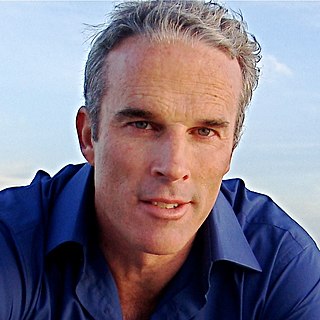A Quote by Dean Kamen
As we move towards 8 or 10 billion people on the planet, there's a little less gold per capita. Each one of us will continue to be fighting over an ever smaller percentage of total resources. This is not a happy thought.
Related Quotes
Of the seven billion people who reside on planet Earth, only 25% could, in the broadest sense of the word, be classified as "Christian" (and the percentage who have personally trusted in Christ for salvation is much smaller), meaning that over five billion people in the world are destined to hell if indeed Christ offers the exclusive path for salvation. To many people, such a claim is offensive.
Take Washington, D.C., which spends over $10,000 per student for education whose student achievement would be dead last if Mississippi chose to secede from the Union. Suppose Washington gave each parent even a $5,000 voucher - that wouldn't mean less money available per student. To the contrary, holding total education expenditures constant, it'd mean more money per student remaining in public schools.
- "Women should all move to Amazonia, or at least vacation there four times a year." - "Amazonia?" - "It's the girl world in my head, where I go when I'm annoyed with Carter, or just men in general. There are five shoe stores per capita, nothing has any calories, and all the books and movies end happy ever after." - "I like Amazonia. When do we leave?
You probably need 1/10 of the world's population for us to continue to exist. There's just too many damn people. You have to somehow get us from 7 billion people to... I don't know what the magic number is, but I imagine at some point, that will happen. And I don't know about you, but I don't think I'm making the cut.
How can we vote for a bill [S.744] that our own CBO says will reduce average wages in America for 12 years, increase unemployment for 7 years, and reduce per capita GNP growth over 25 years? A bill that will admit 30 million people to permanent legal status in the next 10 years? That will dramatically increase the annual immigration flow, and will double the guest worker flow?
Six billion of us walking the planet, six billion smaller worlds on the bigger one. Shoe salesmen and short-order cooks who look boring from the outside - some have weirder lives than you. Six billion stories, every one an epic, full of tragedy and triumph, good and evil, despair and hope. You and me - we aren't so special, bro.
Now, we put out a lot of carbon dioxide every year, over 26 billion tons. For each American, it's about 20 tons. For people in poor countries, it's less than one ton. It's an average of about five tons for everyone on the planet. And, somehow, we have to make changes that will bring that down to zero.
Just look at that Forbes 400. Takes a billion three to get on the Forbes 400 this year. And the aggregate wealth is just staggering. And those people are paying less percentage of their total income to the federal government than their receptionists are. [...] I'll bet a million dollars against any member of the Forbes 400 who challenges - me that the average for the Forbes 400 will be less than the average of their receptionists.
The collective shortfall of the 3.08 billion people (47 percent of world population) who, in 2005, lived below $2.50 per day was $507 billion per annum, which indeed comes to about two-thirds of the present US military budget. This gives us a rough sense of how much the eradication of poverty would cost.




































